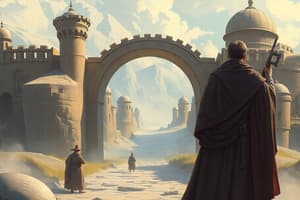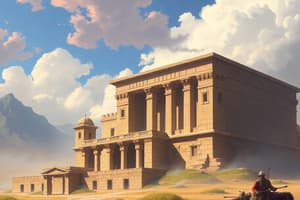Podcast
Questions and Answers
किसी ऐतिहासिक अवधि को खत्म करने के लिए कौन सा महत्वपूर्ण घटना मानी जाती है?
किसी ऐतिहासिक अवधि को खत्म करने के लिए कौन सा महत्वपूर्ण घटना मानी जाती है?
- कॉनस्टेंटिनोपल की पतन (correct)
- फ्रांसीसी क्रांति
- मेसोपोटामिया का उदय
- रूसी क्रांति
जिस स्रोत को 'प्राथमिक स्रोत' के रूप में जाना जाता है, उसमें से कौन सा उदाहरण नहीं है?
जिस स्रोत को 'प्राथमिक स्रोत' के रूप में जाना जाता है, उसमें से कौन सा उदाहरण नहीं है?
- पत्र
- आर्टिफैक्ट
- डायरी
- जीवनी (correct)
किस एक ऐतिहासिक व्यक्ति ने हेलेनिस्टिक संस्कृति को फैलाने में महत्वपूर्ण भूमिका निभाई?
किस एक ऐतिहासिक व्यक्ति ने हेलेनिस्टिक संस्कृति को फैलाने में महत्वपूर्ण भूमिका निभाई?
- क्वीन एलिजाबेथ I
- जूलियस सीज़र
- एलेक्ज़ेंडर द ग्रेट (correct)
- हैरी सडर
इतिहास की पद्धति में निम्नलिखित में से कौन सा चरण शामिल नहीं है?
इतिहास की पद्धति में निम्नलिखित में से कौन सा चरण शामिल नहीं है?
इतिहास के अध्ययन का एक महत्वपूर्ण लाभ क्या है?
इतिहास के अध्ययन का एक महत्वपूर्ण लाभ क्या है?
Flashcards are hidden until you start studying
Study Notes
Key Concepts in History
-
Definition of History
- Study of past events, societies, and cultures.
- Interpretation of human activities over time.
-
Chronology
- Organization of events in the sequence they occurred.
- Important for understanding cause and effect.
-
Historical Sources
- Primary Sources: Original documents, artifacts (e.g., diaries, letters).
- Secondary Sources: Analyses and interpretations of primary sources (e.g., textbooks, biographies).
-
Major Historical Periods
- Prehistory: Before written records.
- Ancient History: Earliest recorded civilizations (e.g., Mesopotamia, Egypt).
- Medieval History: Fall of the Roman Empire to the Renaissance.
- Modern History: Rise of nation-states, industrialization, global conflict.
-
Key Historical Figures
- Alexander the Great: Conqueror who spread Hellenistic culture.
- Julius Caesar: Roman general and statesman; pivotal in the rise of the Roman Empire.
- Queen Elizabeth I: Key figure in the English Renaissance and the defeat of the Spanish Armada.
-
Significant Events
- The Fall of Constantinople (1453): Marked the end of the Byzantine Empire.
- The French Revolution (1789-1799): Established principles of liberty and equality.
- World Wars I and II: Transformative global conflicts leading to significant geopolitical changes.
-
Historical Methodology
- Research: Gathering and evaluating historical data.
- Analysis: Interpreting primary and secondary sources.
- Synthesis: Integrating findings to create coherent narratives.
-
Historiography
- The study of how history is written and interpreted.
- Different schools of thought (e.g., Marxist, feminist, post-colonial).
-
Cultural History
- Exploration of cultural practices, art, and traditions throughout time.
- Focus on how these elements shape societies.
-
Impact of Technology
- Innovations (e.g., printing press, steam engine) that altered societal structures and daily life.
- Role of the internet in contemporary historical research and dissemination.
-
Challenges in History
- Bias in sources and interpretations.
- The dynamic nature of historical narratives as new evidence emerges.
Importance of Studying History
- Understanding past societies helps inform present decisions and future actions.
- Provides context for cultural, political, and social issues today.
- Encourages critical thinking and the ability to analyze complex situations.
इतिहास की प्रमुख अवधारणाएँ
-
इतिहास अतीत की घटनाओं, समाजों और संस्कृतियों का अध्ययन है। यह समय के साथ मानवीय गतिविधियों की व्याख्या भी है।
-
कालक्रम घटनाओं को उनके घटित होने के क्रम में व्यवस्थित करता है। यह कारण और प्रभाव को समझने में महत्वपूर्ण है।
-
प्राथमिक स्रोत मूल दस्तावेज़ और कलाकृतियाँ हैं (जैसे, डायरियाँ, पत्र)। द्वितीयक स्रोत प्राथमिक स्रोतों के विश्लेषण और व्याख्याएँ हैं (जैसे, पाठ्यपुस्तकें, जीवनी)।
ऐतिहासिक काल
- प्रागितिहास: लिखित अभिलेखों से पहले का समय।
- प्राचीन इतिहास: प्रारंभिक दर्ज की गई सभ्यताएँ (जैसे, मेसोपोटामिया, मिस्र)।
- मध्ययुगीन इतिहास: रोमन साम्राज्य के पतन से पुनर्जागरण तक।
- आधुनिक इतिहास: राष्ट्र-राज्यों का उदय, औद्योगीकरण, वैश्विक संघर्ष।
महत्वपूर्ण ऐतिहासिक व्यक्ति
- सिकंदर महान: विजेता जिसने हेलेनिस्टिक संस्कृति का प्रसार किया।
- जूलियस सीजर: रोमन जनरल और राजनेता; रोमन साम्राज्य के उत्थान में महत्वपूर्ण।
- महारानी एलिजाबेथ प्रथम: अंग्रेजी पुनर्जागरण और स्पेनिश आर्मडा की हार में महत्वपूर्ण व्यक्ति।
महत्वपूर्ण घटनाएँ
- कांस्टेंटिनोपल का पतन (1453): बीजान्टिन साम्राज्य का अंत।
- फ्रांसीसी क्रांति (1789-1799): स्वतंत्रता और समानता के सिद्धांतों की स्थापना।
- प्रथम और द्वितीय विश्व युद्ध: परिवर्तनकारी वैश्विक संघर्ष जिससे महत्वपूर्ण भू-राजनीतिक परिवर्तन हुए।
ऐतिहासिक कार्यप्रणाली
- शोध: ऐतिहासिक डेटा एकत्र करना और उसका मूल्यांकन करना।
- विश्लेषण: प्राथमिक और द्वितीयक स्रोतों की व्याख्या करना।
- संश्लेषण: सुसंगत कथाएँ बनाने के लिए निष्कर्षों को एकीकृत करना।
इतिहासलेखन
- इतिहास के लिखे जाने और व्याख्या किए जाने के तरीके का अध्ययन।
- विचार के विभिन्न स्कूल (जैसे, मार्क्सवादी, नारीवादी, उपनिवेशवाद-उत्तराधिकारी)।
सांस्कृतिक इतिहास
- समय के साथ सांस्कृतिक प्रथाओं, कला और परंपराओं की खोज।
- इन तत्वों द्वारा समाजों को कैसे आकार दिया जाता है, इस पर ध्यान केंद्रित करना.
प्रौद्योगिकी का प्रभाव
- नवाचार (जैसे, प्रिंटिंग प्रेस, भाप इंजन) जिसने सामाजिक संरचनाओं और दैनिक जीवन को बदल दिया।
- समकालीन ऐतिहासिक शोध और प्रसार में इंटरनेट की भूमिका।
इतिहास के अध्ययन का महत्व
- पिछले समाजों को समझना वर्तमान निर्णयों और भविष्य की कार्रवाइयों को सूचित करने में मदद करता है।
- आज के सांस्कृतिक, राजनीतिक और सामाजिक मुद्दों के लिए संदर्भ प्रदान करता है।
- आलोचनात्मक सोच और जटिल परिस्थितियों का विश्लेषण करने की क्षमता को प्रोत्साहित करता है।
Studying That Suits You
Use AI to generate personalized quizzes and flashcards to suit your learning preferences.




